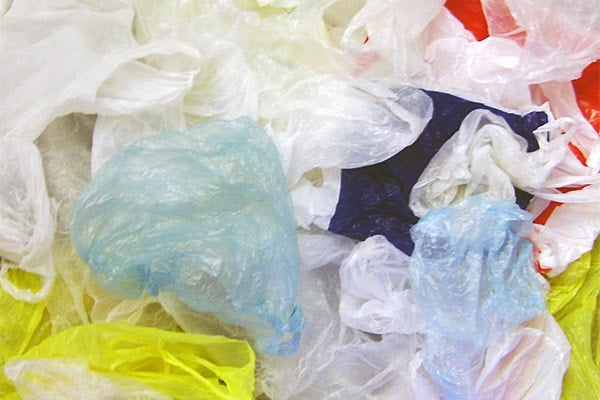
Just one word: plastics
Published: June 7, 2012
With plastic bags back in the news, writer Jenny Hall revisited the topic she originally addressed with Professor Douglas Stephan of Chemistry in August 2009 after Toronto introduced its first five cent surcharge on plastic bags.
How bad are plastic bags for the environment?
The issue is that the vast majority of plastic bags—except for the paint, the coatings that are on them for the branding—will not biodegrade. These are polyethylene bags for the most part. Polyethylene is basically a solid form of oil—it’s made from the by-products of oil refineries. The process takes small ethylene molecules, which are two-carbon chains, and links them together into a big long chain. So you have these long chains of carbon atoms that basically are chemically inert, with the exception of under extreme conditions—they are flammable. They’re not going to age well. There are no bugs that will consume plastic. They’re going to be around a long, long time. That’s the problem.
The other side of that question, as I understand it at least, is simply the sheer numbers. Five hundred billion bags are used worldwide each year. Ontarians use 7 million plastic bags a day.
So surcharges potentially have an impact.
Absolutely. The other thing they do is bring to the forefront a green mentality. They make people think about ways they can avoid needless use of stuff. At the same time it would be nice if they could address the packaging industry, but that’s a tougher one. I notice an inordinate amount of cardboard and packaging when I take out the recycling. An awful lot of it could be avoided.
I’ve done a lot of traveling to Europe. It is routine there for people to carry bags to the store. They have been doing this for ten years or more. In some sense, North America is behind.
What did you think of the proposal to repeal the surcharge?
First, why would you repeal a law that addressed a critical recycling and landfill problem when people have accepted it without much in the way of complaints? On the other hand, why aren’t the retailers who collect this “tax” required to use it to benefit the environment?
Despite the politics, I am afraid the bottom line is that the chemistry does not change. Plastic bags that end in the landfill will be there for hundreds of years.
What do you think of the decision to outright ban plastic bags in Toronto?
The plastic in plastic bags is typically not recycled nor is it biodegradable. Thus to my thinking, having to carry a reusable bag seems a small price to pay to avoid the massive amount of non-degradable plastic in landfill sites for generations to come.
Is biodegradable plastic on the horizon?
There are people working on biodegradable plastic. But the target application is probably not grocery bags. There are already polymers that will biodegrade over a relatively short period of time. For example, sometimes when you get stitches, they are made from a polymer holds your skin together while it heals. Gradually it will degrade and the stitches eventually dissolve. These kinds of medical applications are perhaps a more critical use of new materials than applications like plastic bags.
Are we moving toward abandoning plastic?
We are not going to abandon plastics. Synthetic materials are a very important part of our material world—but we’re not talking here about bags, about the gratuitous use of plastic. For example, plastic is used in all kinds of electronics. The notion of going to a paperless society is based on supporting material—flexible electronics on very readily available polymers. There are all kinds of applications for new polymers.
What is your research about?
We are targeting new technologies to produce polymers. We’re focused on the technology for production more than the actual material that ends up being produced, but we work in concert with polymer chemists.



